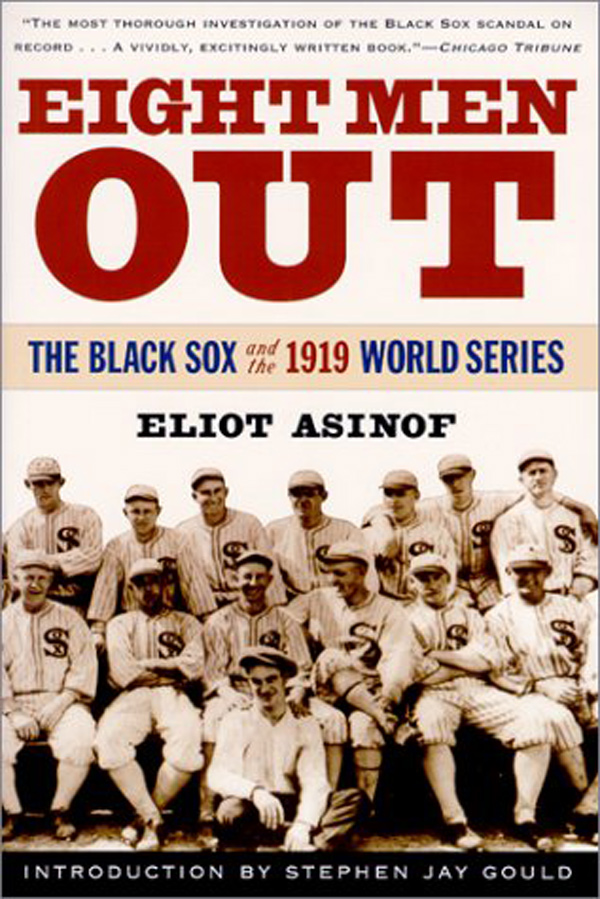 Eight Men Out, Eliot Asinof, 1963. That the 1919 World Series was thrown by the Chicago White Sox was not unique -- sports was rift with betting and criminal influence, both before and since. What made the "Black Sox Scandal" so noteworthy is the way the baseball club owners instituted a higher authority -- the National Baseball Commission -- and handled the problem from the inside out, and from the top down. Eight Chicago players were initially placed on a makeshift "ineligible" list (with the promise to be reinstated if found not guilty of their accusations), and eventually indicted on various conspiracy charges. All eight were acquitted. All eight were never allowed to play professional baseball again.
Eight Men Out, Eliot Asinof, 1963. That the 1919 World Series was thrown by the Chicago White Sox was not unique -- sports was rift with betting and criminal influence, both before and since. What made the "Black Sox Scandal" so noteworthy is the way the baseball club owners instituted a higher authority -- the National Baseball Commission -- and handled the problem from the inside out, and from the top down. Eight Chicago players were initially placed on a makeshift "ineligible" list (with the promise to be reinstated if found not guilty of their accusations), and eventually indicted on various conspiracy charges. All eight were acquitted. All eight were never allowed to play professional baseball again.
Appeal factors such as characterization, setting and detail are all pronounced in Asinof's book. The team roster comes to life and the motivations for the players to do what they were accused of doing (remember, they were acquitted so you can't legally say they did anything illegal!) are clear: they played baseball for a man (Charles Comiskey) who was so notoriously cheap that one story behind the name "The Black Sox" predates the gambling scandal and instead refers to Comiskey's making his underpaid players pay for their own uniform laundering -- and in protest, they played until the white-with-black-pinstripe uniforms were almost completely black with grime.
The best baseball club in the world worked for fame and fortune for a man who wouldn't share the fortune he was making off of them. Wouldn't that gambler's money be pretty durn tempting to men who'd been cheated out of promised bonuses and benefits?
Asinof, writing 40 years after the facts, and while some of the principals were still living (four of The Eight were still alive when the book was published), relied almost entirely on newspaper accounts and other researches -- his introduction says that he met with some of the 1919 team but no one would talk to him about the World Series. Why not? What would so stigmatize the players that they felt they couldn't speak to a reporter about the event that forever changed their lives?
This topic, and the history of Christianity, has long fascinated me, probably contributing to my heretical bend. Ehrman started his career as an Evangelical Christian, out to prove that the Bible was actually and literally written by "God" and therefore inviolate by us mere humans, but his open-eyed researches have lead him to other conclusions. I think this is what I like so much about his work: it's the former smoker who makes the most convincing anti-smoking crusader, after all. Plus his research seems (to a non-specialist) fair, balanced, and thorough.
This is not to say Ehrman is anti-Christian, at all. He's just become much more scholarly than he originally intended, and has some interesting and, to some, controversial conclusions about the earliest versions of Christianity -- which he calls proto-orthodox Christianity.
This book would be a natural to recommend to those who are intrigued by the religious aspects of Dan Brown's Robert Langdon series -- but unlike Brown, Ehrman's books, shorter on story-line, are much longer on research and detail. (In fact, Ehrman wrote one of the [many] books that debunked some of Brown's conspiracy theories, namely Truth and Fiction in The Da Vinci Code, 2006.)
Also recommended (maybe even more strongly but we no longer have it in the BCPL collection) is Ehrman's 1999 Jesus: Apocalyptic Prophet of the New Millennium.


No comments:
Post a Comment